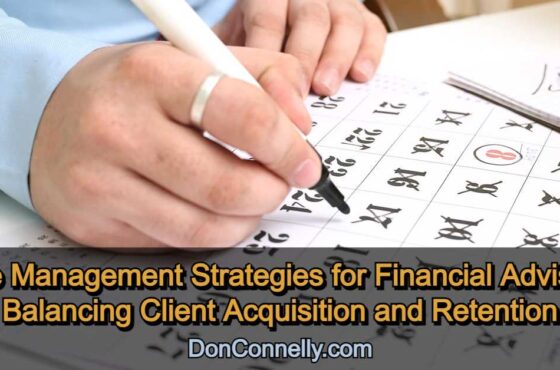What No One Tells You About Being a Financial Advisor
 In my opinion, there has not been any better time to be a financial advisor. At a time when the world is inundated with chaos and hyperbolic media noise, financial advisors are proving their worth. An increasing number of people are seeking guidance and clarity beyond the cookie-cutter world of robo-advisors and financial pundits.
In my opinion, there has not been any better time to be a financial advisor. At a time when the world is inundated with chaos and hyperbolic media noise, financial advisors are proving their worth. An increasing number of people are seeking guidance and clarity beyond the cookie-cutter world of robo-advisors and financial pundits.
Those who seek a career in helping people achieve their life ambitions with personalized advice have the chance to be very successful and personally fulfilled. However, with less than 300,000 practicing financial advisors in a country of 330 million people, relatively few people are choosing that path, and even fewer are succeeding.
Becoming a successful financial advisor is difficult. It’s not a career for everybody. But maybe if those who are struggling knew certain things about the profession up front, things that weren’t clearly explained to them, they could have prepared differently, with eyes wide open and realistic expectations.
Here are five things most financial advisors are never told when starting their career, but that could make a significant difference in how they approach it.
#1. If you’re in it only for the money, you’ll have a difficult time
While it’s true financial advisors have the opportunity to become financially well off, those who focus on that above all else will find it hard to succeed in the long term. While you should expect to be well-compensated for the value you bring to your clients, if you’re not laser-focused at all times on doing what’s best for them, you’ll find yourself constantly having to replace them.
Financial advisors need to realize from the get-go that the real long-term profits from this business are in the relationships you build with clients, not the commissions or fees from investment sales. The lifetime value of a loyal client—through ongoing interaction and referrals—can be substantial. And, as you add new clients, the lifetime value of your book of business compounds itself.
Putting your clients first in all you do and striving to make their advisory experience special should be all the motivation you need because it directly translates into success.
#2. You must love working with people
Many advisors are drawn to the business because they love working with numbers and analyzing spreadsheets. Many relish the opportunity to study hard and read reports. But if you don’t consider yourself a “people person” or you struggle in social settings, you will have a rough time.
Highly successful advisors love working with people and are energized by their interactions with them. They have a natural penchant for the soft skills advisors need in communication—listening with interest, demonstrating empathy and a natural curiosity, and taking the time to communicate their value to their clients. They do it because they genuinely love working with people.
#3. You need to develop your soft skills
Most people are not natural communicators. But you can’t be a successful financial advisor without solid communication skills. Whether you’re selling investment products or advice, you won’t get far if you can’t convince your prospects to commit to you.
The process requires mastering your soft skills to build rapport and a personal connection with your prospect, which requires proactive listening and the ability to allow your authenticity to show through. That’s critical for building trust, which is the foundation of an advisory relationship. It involves asking the right questions to uncover your prospects’ intents and motivations and being able to inspire them to take action.
All that requires superior communication or soft skills involving hours and hours of practice. Advisors who focus first on mastering their soft skills are much more likely to succeed than those who don’t.
#4. You must invest in yourself
Regardless of where you set up shop—at a wirehouse or with an advisory firm—it requires a genuine entrepreneurial spirit to get ahead in this business because if it is to be, it is up to thee. You are your only source of motivation, and only you can determine how far you can go. As such, you must be willing to invest in yourself in terms of both time and money. You’ll need the time to learn from your mistakes and the capital to improve yourself and grow your business.
When you invest in yourself, you have a bigger stake in your success and are much more likely to do what is necessary to achieve it.
#5. Get a mentor
If you ask most financial advisors what they would have done differently when starting out, many will say they should have actively sought out a mentor. Having the right mentor can not only shorten your learning curve, but they can instill the confidence most young advisors lack in their abilities. A good mentor is your coach and collaborator, offering support and feedback on how to best grow your practice.
When looking for a mentor, seek out an advisor whose practice, style, and leadership you would like to emulate.
Watch this 3-minute video to learn how our 24-step training program can help you succeed as a Financial Advisor.
See program details and enroll today!
Available as a self-paced program (always open) or as a 12-week coaching program (open only a couple of times a year), this training will change the way you view you practice and give you an enormous advantage over your competition. Select your format and enroll today!




Excellent talk, Its the right time to join the team and polish the selling skills to grab the bigger portion of the market -Skaiser
Thanks for reading, Skaiser, and for joining the conversation!
~Diana